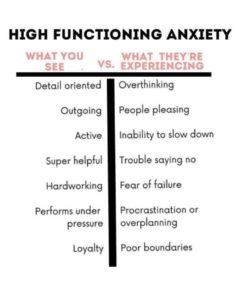Do You Have High Functioning Anxiety?
12 Anxiety Symptoms That Might Point to a Disorder
Everyone has anxiety from time to time, but chronic anxiety can interfere with your quality of life. While perhaps most recognized for behavioral changes, anxiety can also have serious consequences on your physical health.
- Panic Attacks
- Depression
- Headaches
- Irritability
- Pounding Heart
- Breathing Problems
- Loss of Libido
- Upset Stomach
- Extreme Fatigue
- Increased Blood Pressure
- Unexplained Aches and Pains
Anxiety disorders can happen at any stage of life, but they usually begin by middle age. Women are more likely to have an anxiety disorder than men, says the National Institute of Mental Health (NIMH).
Long-term anxiety and panic attacks can cause your brain to release stress hormones on a regular basis. This can increase the frequency of symptoms such as headaches, dizziness, and depression.
Repeatedly feel anxious and stressed, your body never gets the signal to return to normal functioning. This can weaken your immune system, leaving you more vulnerable to viral infections and frequent illnesses. Also, your regular vaccines may not work as well if you have anxiety.
What is High Functioning Anxiety?
6 Ways to Cope with Anxiety
- Question your thought pattern – Negative thoughts can take root in your mind and distort the severity of the situation. One way is to challenge your fears, ask if they’re true, and see where you can take back control.
- Practice focused, deep breathing – Try breathing in for 4 counts and breathing out for 4 counts for 5 minutes total. By evening out your breath, you’ll slow your heart rate which should help calm you down. – The 4-7-8 technique is also known to help anxiety.
- Use aromatherapy – Whether they’re in oil form, incense, or a candle, scents like lavender, chamomile, and sandalwood can be very soothing. Aromatherapy is thought to help activate certain receptors in your brain, potentially easing anxiety.
- Go for a walk or do 15 minutes of yoga – Sometimes, the best way to stop anxious thoughts is to walk away from the situation. Taking some time to focus on your body and not your mind may help relieve your anxiety.
- Write down your thoughts – Writing down what’s making you anxious gets it out of your head and can make it less daunting.
- Try the 3-3-3 method – Name three things you see. Name three sounds you hear. Move three parts of your body.
#FrameofMindFriday

